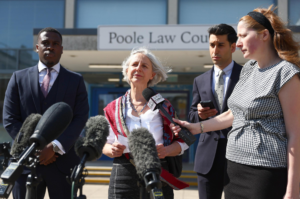Trump administration has waded into Britain’s heated abortion rights debate by throwing its support behind a UK-based anti-abortion activist recently convicted for breaching protest restrictions. The U.S. intervention has triggered renewed diplomatic friction between the two countries and could complicate ongoing trade negotiations.
Livia Tossici-Bolt, a 64-year-old dual UK-Italian citizen and retired NHS medical scientist, was handed a two-year conditional discharge and fined over £20,000 for violating a buffer zone law outside a BPAS abortion clinic in Bournemouth. Her sign simply read, “Here to talk if you want to.” A UK court ruled that her presence breached legislation prohibiting protests near abortion clinics.
Tossici-Bolt said she never imagined US officials would issue a public statement in her support Credit: David Rose For the Telegraph
In a move that surprised many, the U.S. State Department publicly condemned the conviction, stating: “We are disappointed with the UK court’s conviction of Livia Tossici-Bolt… Freedom of expression must be protected for all.” This marked an unusually direct intervention in British domestic affairs.
The case has drawn global attention, particularly after it was revealed that Tossici-Bolt had met with Sam Samson, a senior adviser from the U.S. State Department, and representatives from Alliance Defending Freedom (ADF), a U.S.-based conservative Christian group. The group is also supporting Tossici-Bolt’s legal efforts and broadly opposes the UK’s buffer zone laws.
Tossici-Bolt has welcomed the support but denied being a political pawn. “I have so many worries already, I can’t worry about things outside my control,” she said. “I am passionate, I will continue to be passionate about this.”
She described her conviction as a “dark day for Great Britain,” claiming she was punished for merely offering consensual conversation. “Freedom of expression is in a state of crisis in the UK,” she said. “What has happened to this country?”
Critics, however, argue that such protests, even those claiming to be peaceful, can intimidate vulnerable women facing difficult decisions. The buffer zone laws were designed to ensure privacy and protection for those seeking abortion services.
The U.S. State Department’s continued interest in such cases has alarmed UK officials. A senior American source hinted that the issue could impact the trade dialogue with Britain, stating: “There can be no free trade without free speech.”
Tossici-Bolt further claimed that the current UK government has let down its own citizens by not defending free expression, adding that it should not take a foreign power to highlight domestic civil liberties issues. She linked her case to broader concerns around freedom of speech in British institutions, including universities and healthcare.
The U.S. has long been divided on abortion, with the Trump administration notably embracing a strong anti-abortion stance and amplifying voices like Tossici-Bolt’s. Her case comes amid growing activism on both sides of the Atlantic, with debates intensifying about the limits of protest, speech, and individual rights in the abortion discourse.
As the UK navigates its evolving legal and cultural stance on reproductive rights, and the U.S. signals stronger international advocacy on conservative social issues, cases like Tossici-Bolt’s could become flashpoints in a broader transatlantic ideological divide.
Whether this will derail diplomatic cooperation or merely mark a new chapter in U.S.-UK relations remains to be seen.


